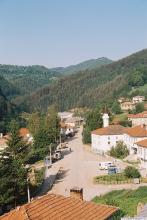Vladimir Zhobov
Village Image:

| other sg n adj | some.kind sg n adj | now adv | what indcl interr | comp | acc 1sg clt |
[...]
|
what indcl interr | [...] | dat 2pl clt | 1sg pres I | something sg n |
| excl | still adv | much adv | have 2sg pres I | comp | tell 2sg pres I | for | disc | for |
| dish pl f def | rel | 2pl pres aux clt | make pl L.part I | one sg n adj | time sg n | old pl adj | Rhodope pl adj | dish pl f |
| excl | old sg n def med adj | excl | how interr | comp | dat 2sg clt | say 1sg pres P | old sg n def med adj | what sg n interr | 3sg impf cop |
| fut | boil 2sg pres P | one sg f adj | pan sg f | bean sg m | fut | acc m 3sg clt | fatten 2sg pres P | and | fut |
| in | big pl adj | pot pl m | fut | pour 2sg pres P | and | banitsa pl f | fut | create 2sg pres P |
| what indcl interr | comp | dat 2sg clt | acc n 3sg clt | say 1sg pres I |
| and | banitsa sg f def | by | old.time adv | how interr | acc f 3sg clt | say 2pl impf I |
| old.time pl def dist adj | banitsa sg m |
|
bkch
|
| banitsa sg m | fut | hes | [...] | beat 2sg pres P | three | four | egg pl n | with | semolina sg m | little adv |
| rice sg m | fut | boil 2sg pres P | one sg n adj | other sg n adj | and | fut | make 2sg pres P | banitsa pl f |
| with | butter sg n | then adv | acc 3pl clt | make 3pl impf I | and | meat sg n |
| fut | acc n 3sg clt | chop 3pl pres P | coarsely adv | thus med adv | coarsely adv | acc n 3sg clt | pour 3pl pres P |
| and | acc n 3sg clt | strain 3pl pres I | with | little adv | water sg f | thus med adv | fut | acc n 3sg clt | push 3pl pres P |
| by | little adv | fut | acc n 3sg clt | pour.out 3pl pres P | in | big sg m adj | pot sg m |
| and | fut | boil 3pl pres P | polenta sg m | fut | acc m 3sg clt | extract 3pl pres P | in | such pl med adj | big.chunk pl m |
| each sg m adj | fut | eat 3sg pres I | until | acc refl clt | eat.fill 3sg pres P |
Text copyright © 2011-2016 Ronelle Alexander and Vladimir Zhobov. Texts and other parts of the website may be copied only for non-commercial, research, or educational purposes, provided the source of the material is cited accordingly. Cited material may not include the entire website or substantial portions thereof.
Comments and questions may be addressed to bdlt@berkeley.edu.
Recommended Model for Citations
Bulgarian Dialectology as Living Tradition [2016] (http://www.bulgariandialectology.org, visited on 1 March 2016)
Babjak 1: 13-15. In: Bulgarian Dialectology as Living Tradition [2016] (http://www.bulgariandialectology.org, visited on 1 March 2016)